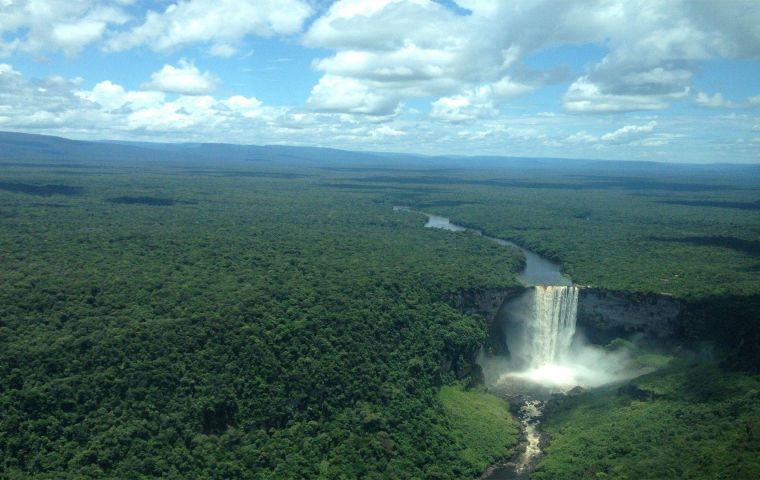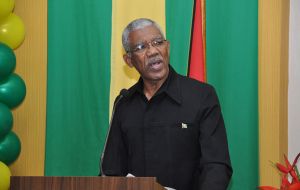MercoPress. South Atlantic News Agency
Guyana optimistic it will win the Esequibo dispute at the International Court of Justice
 The vast area west of the Essequibo River makes up two-thirds of the territory of Guyana and has been claimed by Venezuela as its own since the 19th century
The vast area west of the Essequibo River makes up two-thirds of the territory of Guyana and has been claimed by Venezuela as its own since the 19th century  “We hope that we will get a judgment and we are confident that we will be getting a very favorable judgment in a very short time,” Granger said
“We hope that we will get a judgment and we are confident that we will be getting a very favorable judgment in a very short time,” Granger said President David Granger is optimistic that the International Court of Justice (ICJ) will dispense a ruling in Guyana’s favor in the border case with Venezuela. The Guyanese president expressed these sentiments while appearing on the popular radio program, Hot Seat.
“We hope that we will get a judgment and we are confident that we will be getting a very favorable judgment in a very short time,” Granger said, adding that the issue had been a “monkey on our backs for the last half-century”.
“The territorial question has a lot to do with our petroleum exploration, the lineation of our maritime frontiers and seeking the court’s reassertion of the agreement of 1899 which clearly demarcated our borders.”
The vast area west of the Essequibo River makes up two-thirds of the territory of Guyana and has been claimed by Venezuela as its own since the 19th century, when Guyana was still a British colony. The international Arbitral Award of October 1899 settled the Venezuelan claim, firmly defining the disputed territory as belonging to Guyana.
But Venezuela contends that the Arbitral Award was null and void, and its claim on Guyana’s territory has been renewed since ExxonMobil made its first world class oil discovery offshore the CARICOM nation.
Despite the dispute, President Granger said Guyana has been fulfilling its humanitarian mandate by facilitating Venezuelan migrants crossing the border to escape the socio-economic turmoil in their homeland.
Granger stressed that he did not view the migrant situation as a threat to Guyana’s territorial integrity. “Should there be a military threat, I am very confident that the defence forces will be capable of deterring aggression,” Granger said.
The ICJ will begin hearing arguments in March 2020 on whether it has jurisdiction over the case filed by Guyana as it relates to the Arbitral Award of 1899.




Top Comments
Disclaimer & comment rules-

Read all comments“We hope that we will get a judgment” and so you should.
Dec 07th, 2019 - 09:37 am 0”22. Arbitral Award of 3 October 1899 – Guyana v. Venezuela: Report ICJ (1/9/2018-31-7/2019)
12. Arbitral Award of 3 October 1899 (Guyana v. Venezuela) – p44-46/69
207. On 29 March 2018, Guyana filed an Application instituting proceedings against the Bolivarian Republic of Venezuela.
208. In its Application, Guyana requested the Court “to confirm the legal validity and binding effect of the Award Regarding the Boundary between the Colony of British Guiana and the United States of Venezuela, of 3 October 1899”. The Applicant claimed that the 1899 Award was “‘a full, perfect, and final settlement’ of all questions
45/69
relating to determining the boundary line between the colony of British Guiana and Venezuela”.
209. Guyana asserted that between November 1900 and June 1904, a joint Anglo- Venezuelan Boundary Commission had “identified, demarcated and permanently fixed the boundary established by the … Award” before the signing of a Joint Declaration by the Commissioners on 10 January 1905 (referred to as “the 1905 Agreement”).
210. Guyana contended that, in 1962, for the first time, Venezuela had contested the Award as “arbitrary” and “null and void”. This, according to the Applicant, had led to the signing of the Agreement to resolve the controversy between Venezuela and the United Kingdom of Great Britain and Northern Ireland over the frontier between Venezuela and British Guiana at Geneva on 17 February 1966, which “provided for recourse to a series of dispute settlement mechanisms to finally resolve the controversy”.
https://mar-petroleumexplorationconsultant.com/xx-essequibo-dispute/
Commenting for this story is now closed.
If you have a Facebook account, become a fan and comment on our Facebook Page!